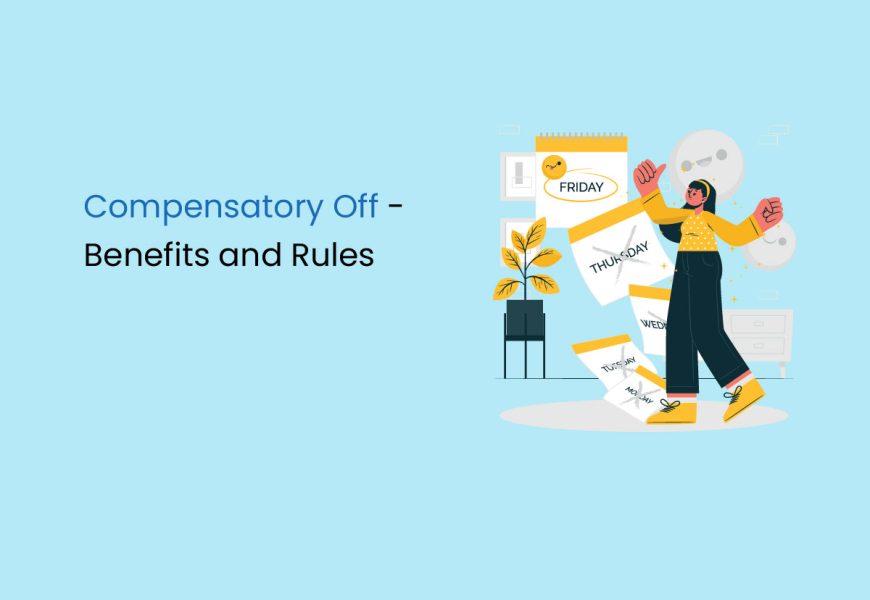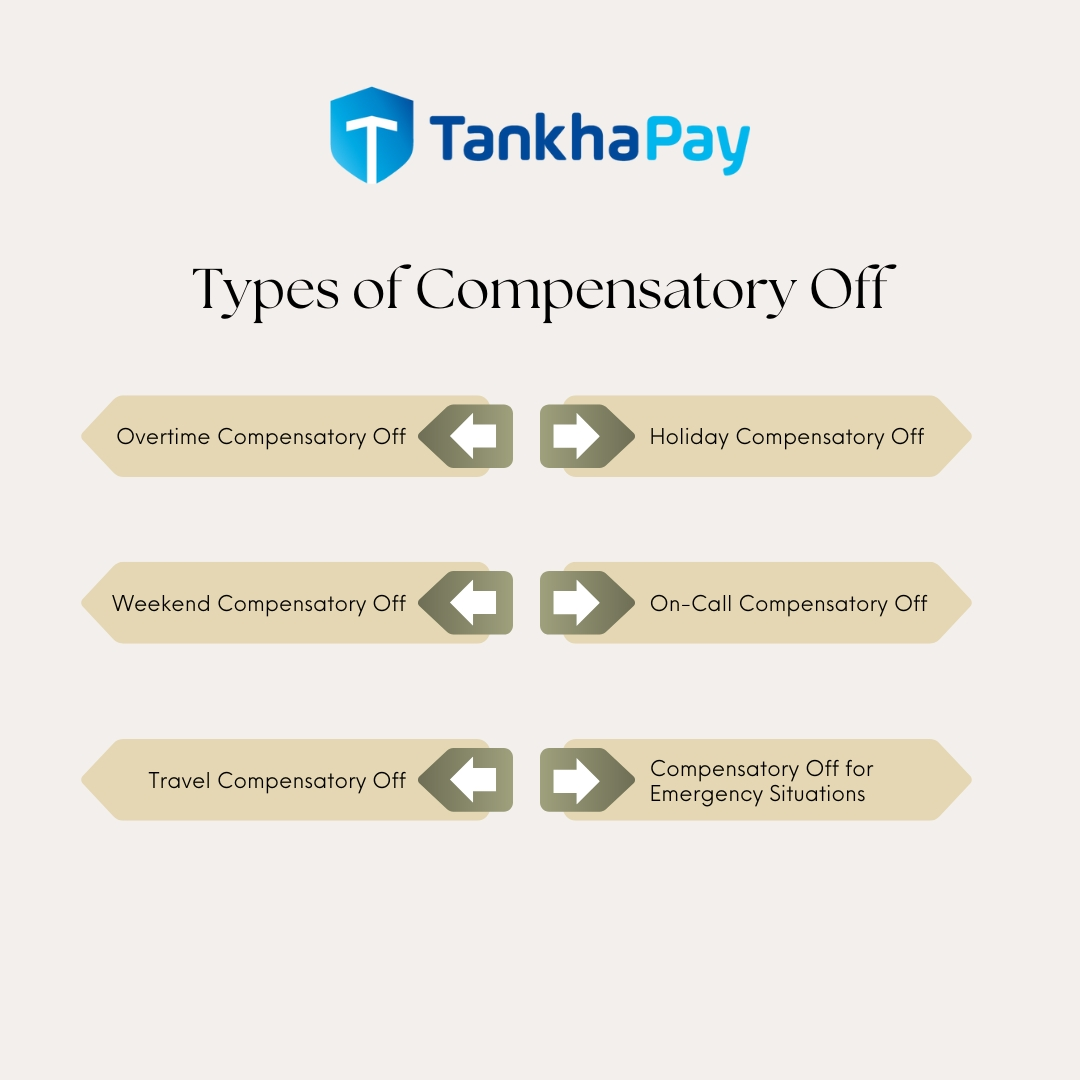Compensatory off or Comp off is a leave an employer grants to an employee who works on a holiday or for extra working hours beyond their regular working shift. This means that if an employee works on a Sunday or any other non-working day, they can receive reimbursement in the form of leave in exchange for the same.
Compensatory off leaves are given as a reward to employees for the extra effort they put in for the organisation’s growth. It motivates employees to maximise their efforts and even enjoy their time whenever needed.
What is the meaning of Compensatory Off?
Compensatory off, also known as compensatory leave or comp off, allows employees to take paid time off instead of overtime pay when they work under irregular circumstances, such as when the business is closed.
Types of Compensatory Off
The different types of compensatory off provided by organisations are as follows:
- Overtime Compensatory Off: When employees work overtime hours, it is counted as overtime comp-offs. According to the policy, they can avail of a minimum of half a day to a full day off based on the number of working hours. The additional hours worked are usually converted into equivalent time off or payment options.
- Holiday Compensatory Off: It is common for employees to work on holidays on behalf of the company. In return, they are granted compensatory holidays, which can be taken on different days or carried forward to the following year.
- Weekend Compensatory Off: It is common for employees to work on weekends. They may be eligible for compensatory time off to balance their work schedule. This means they can take a day off before the working weekend or an equivalent day off during the regular workweek.
- On-Call Compensatory Off: Some organisations require on-call arrangements where employees work double shifts during emergencies. In such cases, compensatory off is provided to balance additional time spent on-call.
- Travel Compensatory Off: When employees must travel to our station for urgent work or urgent meetings, organisations should compensate them with a comp-off for the time spent travelling. Alternatively, employees can take a day off.
- Compensatory Off for Emergency Situations: Employees may be required to work additional hours or be on duty continuously during certain situations, such as a crisis or emergency. To ensure they have time to rest and recover from the demanding circumstances.
How to Create a Compensatory Off-Policy
You can create a compensatory off policy by following these steps:
- Review Existing Policies: Review the company’s current policies and procedures thoroughly. This step will present a clear understanding of the existing comp off landscape and highlight potential issues.
- Define Comp Off Goals: It is essential to clearly state the company’s objectives for implementing a Comp Off policy. This can include boosting employee morale, reducing overtime expenses, or enhancing scheduling flexibility.
- Research Laws and Regulations: Conduct thorough research to ensure compliance with relevant laws and regulations. Familiarise yourself with any state or country-specific requirements governing compensatory time off.
- Draft Policy: Draft a clear and unambiguous policy covering all essential aspects related to comp offs. Specifically, include the following:
- Eligibility criteria for comp off.
- Accrual rules for comp off.
- Procedures for requesting comp off.
- Deadlines for comp off requests.
- Approval mechanisms for comp off.
- Limits on comp off accrual.
- Conditions under which comp off is forfeited.
- Employee Feedback: Encourage employees to give feedback on the draft policy to ensure alignment with employee and company needs.
- Incorporate Feedback: Make necessary revisions to the policy based on the valuable feedback received from your employees.
- Finalise and Communicate: Finalise and communicate the policy to all employees after making all necessary revisions. Provide clear instructions on how to request and use comp time off.
Benefits of Compensatory Off for Employers
The benefits of comp off for employers are as follows:
- Cost Savings: Employers can save on overtime pay by offering paid time off instead of extra wages for overtime work.
- Flexible Scheduling: Employers can use comp off time to manage staffing levels during peak work hours without incurring additional costs.
- Employee Retention: Offering comp off as a benefit can enhance employee satisfaction and motivation, showcasing the employer’s dedication to achieving work-life balance.
- Improved Work-Life Balance: It can reduce burnout and improve overall well-being, increasing productivity and job satisfaction by promoting a healthier work-life balance for employees.
- Adaptability: Employers can offer comp-offs to balance workload and boost efficiency.
Benefits of Compensatory Off for Employees
The benefits of comp off for employees are as follows:
- Additional Paid Time Off: Employees can use paid time off for the extra work for personal and family needs without loss of income.
- Flexibility: Employees have the freedom to choose when they take time off, whether it’s for personal reasons, rest, or vacations.
- Reduced Overtime: Offering comp offs can limit overtime hours, reduce fatigue, and increase employee leisure time.
- Improved Job Satisfaction: Recognizing an employee’s extra effort and commitment can boost job satisfaction.
- Control Over Time Off: Employees have better flexibility to plan their time off and better balance work and personal life.
Compensatory Off Rules For Employees
The rules for comp off for employees are as follows:
- Adhere to your company’s policies on comp off to request compensatory time off
- Use comp offs only for legitimate reasons
- Keep communication open with your employer
- Avoid making last-minute or unexpected requests
- Don’t use comp time unfairly or against labour laws
Compensatory Off Rules For Employers
The rules for comp off for employers are as follows:
- Ensure transparent and fair policies for compensatory time
- Give comp time off promptly and communicate effectively with employees
- Keep communication open and concise for a thriving work environment
- Avoid making strict policies that discourage employees from using their comp time
- Encourage a balance between work and personal life
How to Avail Compensatory Off?
The policies and procedures for compensatory off may vary depending on the organisation and the employee’s designation. Here are the general steps that employees follow to get comp offs:
- Request for compensatory off: If an employee needs to take time off after working overtime, they must submit a request for a compensatory off. The request should include the period they will be unavailable to the organisation.
- Review of the request: The organisation reviews the compensatory-off request by checking the overtime information in their database.
- Matching overtime and offs: If the overtime period matches the requested period for the off, the employee is granted the compensatory off.
- Granting the compensatory off: If the leave request exceeds the time sanctioned for overtime, the employee is granted leave only in compensation for the overtime work. If the requested leave period is longer than the overtime period, the employee may be asked to look for other alternatives.
Frequently Asked Questions
How do you calculate comp off?
The standard rule is to pay an employee on a time-and-a-half basis. For instance, if an employee works for an hour, they should be paid for 1.5 hours.
Can comp off be denied?
Employees must formally request comp time for overtime, and employers may deny it based on valid reasons.
What are the limitations of Compensatory Offs?
Administering and tracking time off can be complicated due to accrual and expiration rules, seasonal variations, payroll intricacies, and potential employee misuse.
Can compensatory off be carried over to next year?
Unused accrued leaves can be carried over to the next year as compensatory off. Companies have policies, so checking with HR or the organisation's policy for details is best.
What are the legal aspects and regulations related to compensatory off?
In India, compensatory time off is available to non-exempt employees eligible for overtime pay. Policies must comply with labour laws, which may vary by state. Union agreements can influence comp-off terms. Regular policy reviews are crucial to ensure compliance with labour laws and stay aligned with changing regulations.
Compensatory Off (Comp Off) vs Overtime Pay
Both comp off and overtime pay are ways to compensate employees for working extra hours. Comp off refers to time off from work or leave an employee accrues for overtime. In contrast, overtime pay is extra cash that is granted based on the number of additional hours an employee works.
What are the rules for Compensatory Off against working on Public holidays and weekly off days?
The rules for compensatory leave (comp off) against working on public holidays and weekly off days are as follows:
- Employees who work on 26th January can get a comp off the next day. However, there is a time limit for utilising this comp off, and it must be used within a stipulated period. If not, then it is considered exhausted.
- When an employee works on a Sunday when the company has an off, it is up to the employer or the employee's boss to determine if the person has genuinely come to the office for work they are called for. If yes, the same rule regarding comp off applies, but it depends on their workload.
- According to the rules set by the government, comp offs can be adjusted along with the employee's leave. This means an employee can take leave along with a comp off.
Compensatory off for a tour on a public holiday or weekly off
If a weekly off or public holiday falls during a work-related travel or tour, the employee will be compensated with 1/2 day off for each weekly off or public holiday. In this context, work would mean meeting clients and spending time on-site. However, time spent on travel will not be considered as part of working on a holiday.
Why was Comp Off created?
It's a commonly known fact that employees often only put in their best effort if they feel appreciated and rewarded. Compensatory time off can incentivise employees to give their all in exchange for recognition and compensation.
Before compensatory time off or payment was established, many grievances plagued employees. These included overexploitation, with employees being made to work long and untimely hours, often stretching into the night. They were also usually paid meagre salaries, with no extra compensation for overtime work. This took a toll on their health, with long working hours leading to health issues that their salaries couldn't cover.
These grievances led to a loss of interest in work, anger, and general disagreement among employees. This often resulted in employees refusing to put in extra effort, leading to the degradation of the organisation. It also led to strikes and protests by employees across different organisations to secure their rights.
After much negotiation and discussion, it was agreed to provide employees with extra cash or time off to compensate for their extra effort.
Also Read
- Payroll Process – Basics, Requirements, Compliances
- HR Policies – A Roadmap for Organisational Success
- What is Payroll Management System? – Definition and Importance






















